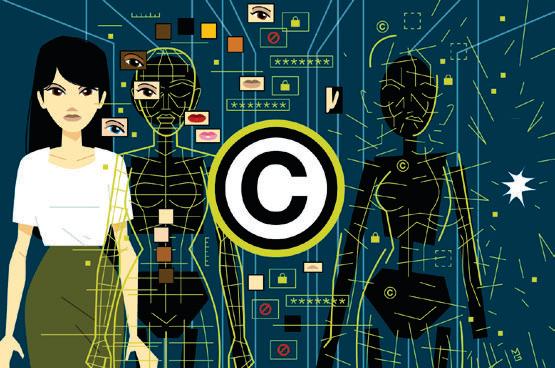Versuchen GOLD - Frei
Copyright Laws Can Stop Deepfakes
Scientific American
|December 2025
The U.S. should give its residents rights to their own face and voice
-

GENERATIVE ARTIFICIAL intelligence can now counterfeit reality at an industrial scale. Deepfakes—photographs, videos and audio tracks that use AI to create convincing but entirely fabricated representations of people or events—aren’t just an Internet content problem; they are a social-order problem. The power of AI to create words and images that seem real but aren't threatens society, critical thinking and civilizational stability. A society that doesn’t know what is real cannot self-govern.
We need laws that prioritize human dignity and protect democracy. Denmark is setting the example. In June the Danish government proposed an amendment to its copyright law that would give people rights to their own face and voice. It would prohibit the creation of deepfakes of a person without their consent, and it would impose consequences on those who violate this rule. It would legally enshrine the principle that you own you.
What makes Denmark’s approach powerful is the corporate fear of copyright-infringement legalities. In a study uploaded to preprint server arXiv.org in 2024, researchers posted 50 nude deepfakes on X and reported them to the platform in two ways: 25 as copyright complaints and 25 as nonconsensual nudity under X’s policies. X quickly removed the copyright claims but took down none of the intimate-privacy violations. Legal rights got action; privacy didn't.
Diese Geschichte stammt aus der December 2025-Ausgabe von Scientific American.
Abonnieren Sie Magzter GOLD, um auf Tausende kuratierter Premium-Geschichten und über 9.000 Zeitschriften und Zeitungen zuzugreifen.
Sie sind bereits Abonnent? Anmelden
WEITERE GESCHICHTEN VON Scientific American

Scientific American
Probiotic Hope and Hype
Despite their popularity, supplements with billions of \"good\" microbes help only a few illnesses, research shows
3 mins
January 2026

Scientific American
Mondays Really Are More Stressful
The start of the workweek can be a biologically measurable stressor, with consequences for long-term health that can stretch into retirement
4 mins
January 2026

Scientific American
Tiny Display
An e-paper breakthrough brings extremely high-resolution color
2 mins
January 2026

Scientific American
Fine-Feathered Snack
A bat's tracker documents a dramatic midair hunt
2 mins
January 2026

Scientific American
OUR ROBOTIC PICTURE
Will mechanical helpers ever be commonplace at home, at work and beyond?
11 mins
January 2026

Scientific American
"Use Your Words" Can Be Good for Kids' Health
Writing or expressing feelings can help adults mentally and physically. Kids are no different
5 mins
January 2026

Scientific American
Distant Diplomacy
Unrelated species “talk” and understand one another to avoid threats
2 mins
January 2026

Scientific American
Behind the Nobel
A 2025 winner reflects on the mysterious T cells that won him the prize
5 mins
January 2026

Scientific American
A Suite of Killers
Heart ailments, kidney diseases and type 2 diabetes actually may be part of just one condition. It's called CKM syndrome
10 mins
January 2026

Scientific American
Static Launch
Tiny worms leap toward their fruit fly hosts with an electric “tractor beam”
3 mins
January 2026
Listen
Translate
Change font size
